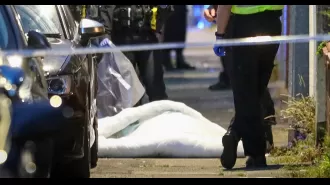Coroner finds problems with laws on assisted dying after man's death.
Queensland gives patients ultimate control over dangerous drugs, with laws heavily favoring their autonomy.
September 12th 2024.

In his recent findings, Queensland coroner David O'Connell expressed concern over the state's voluntary assisted dying scheme safeguards. He discovered that an elderly man had tragically passed away after mistakenly using a fatal substance that was intended for someone else.
In his statement, O'Connell emphasized the importance of ensuring that individuals are not put in a position where they may make unwise decisions. This case, which was brought to the attention of the Coroners Court in Brisbane back in February, involved the death of a man in his 80s, who was referred to by the pseudonym ABC.
O'Connell revealed that ABC had kept the voluntary assisted dying substance in his home even after it was no longer required. He clarified that his findings were not meant to pass judgment on the merits of VAD, but rather to bring attention to the tragedy that occurred just 107 days after its legalization.
The coroner also noted that the current laws overwhelmingly favored the autonomy of terminally ill patients, to the point where they were given access to the most dangerous drugs legally produced in Queensland. He expressed concern over the fact that these substances were made available to individuals with no medical training, no regulatory oversight, and in a period of great personal and emotional turmoil.
Due to confidentiality reasons, ABC's name, along with those of his family members, could not be disclosed. It was revealed that the substance involved in his death was obtained legally after Queensland's VAD laws came into effect in January 2023. Under these laws, individuals were allowed to self-administer the substance in a private location, but they were required to nominate someone who would return any unused portions within 14 days.
Unfortunately, in this case, the man was unable to return the substance to a hospital, as he was confined to his home. No arrangements were made for a health professional to collect it either. ABC's daughter, who was present at the inquest, tearfully recounted the tragic discovery of her father's passing. She shared that she had found him in his chair, with the house locked up and the blinds drawn. It was then that she realized he had passed away, and upon finding an empty box in the kitchen, she immediately recognized it as the VAD substance.
After thorough investigation, O'Connell concluded that there was no breach of the law by health authorities, despite the overdue return of the VAD substance in ABC's home. He did, however, highlight several operational flaws in the system, which he believed were not adequately addressed in the legislation. He recommended that the government implement an earlier draft of the VAD laws, which required the oversight of a medical professional at all times.
In response to these recommendations, Queensland Health Minister Shannon Fentiman assured that the government would carefully consider them and that they had already begun work on reviewing the legislation. She also confirmed that a review would be conducted next year, and the recommendations put forth by the coroner would be taken into account. It is clear that this case has brought to light the need for stricter safeguards and oversight in the voluntary assisted dying scheme in Queensland.
In his statement, O'Connell emphasized the importance of ensuring that individuals are not put in a position where they may make unwise decisions. This case, which was brought to the attention of the Coroners Court in Brisbane back in February, involved the death of a man in his 80s, who was referred to by the pseudonym ABC.
O'Connell revealed that ABC had kept the voluntary assisted dying substance in his home even after it was no longer required. He clarified that his findings were not meant to pass judgment on the merits of VAD, but rather to bring attention to the tragedy that occurred just 107 days after its legalization.
The coroner also noted that the current laws overwhelmingly favored the autonomy of terminally ill patients, to the point where they were given access to the most dangerous drugs legally produced in Queensland. He expressed concern over the fact that these substances were made available to individuals with no medical training, no regulatory oversight, and in a period of great personal and emotional turmoil.
Due to confidentiality reasons, ABC's name, along with those of his family members, could not be disclosed. It was revealed that the substance involved in his death was obtained legally after Queensland's VAD laws came into effect in January 2023. Under these laws, individuals were allowed to self-administer the substance in a private location, but they were required to nominate someone who would return any unused portions within 14 days.
Unfortunately, in this case, the man was unable to return the substance to a hospital, as he was confined to his home. No arrangements were made for a health professional to collect it either. ABC's daughter, who was present at the inquest, tearfully recounted the tragic discovery of her father's passing. She shared that she had found him in his chair, with the house locked up and the blinds drawn. It was then that she realized he had passed away, and upon finding an empty box in the kitchen, she immediately recognized it as the VAD substance.
After thorough investigation, O'Connell concluded that there was no breach of the law by health authorities, despite the overdue return of the VAD substance in ABC's home. He did, however, highlight several operational flaws in the system, which he believed were not adequately addressed in the legislation. He recommended that the government implement an earlier draft of the VAD laws, which required the oversight of a medical professional at all times.
In response to these recommendations, Queensland Health Minister Shannon Fentiman assured that the government would carefully consider them and that they had already begun work on reviewing the legislation. She also confirmed that a review would be conducted next year, and the recommendations put forth by the coroner would be taken into account. It is clear that this case has brought to light the need for stricter safeguards and oversight in the voluntary assisted dying scheme in Queensland.
[This article has been trending online recently and has been generated with AI. Your feed is customized.]
[Generative AI is experimental.]
0
0
Submit Comment





